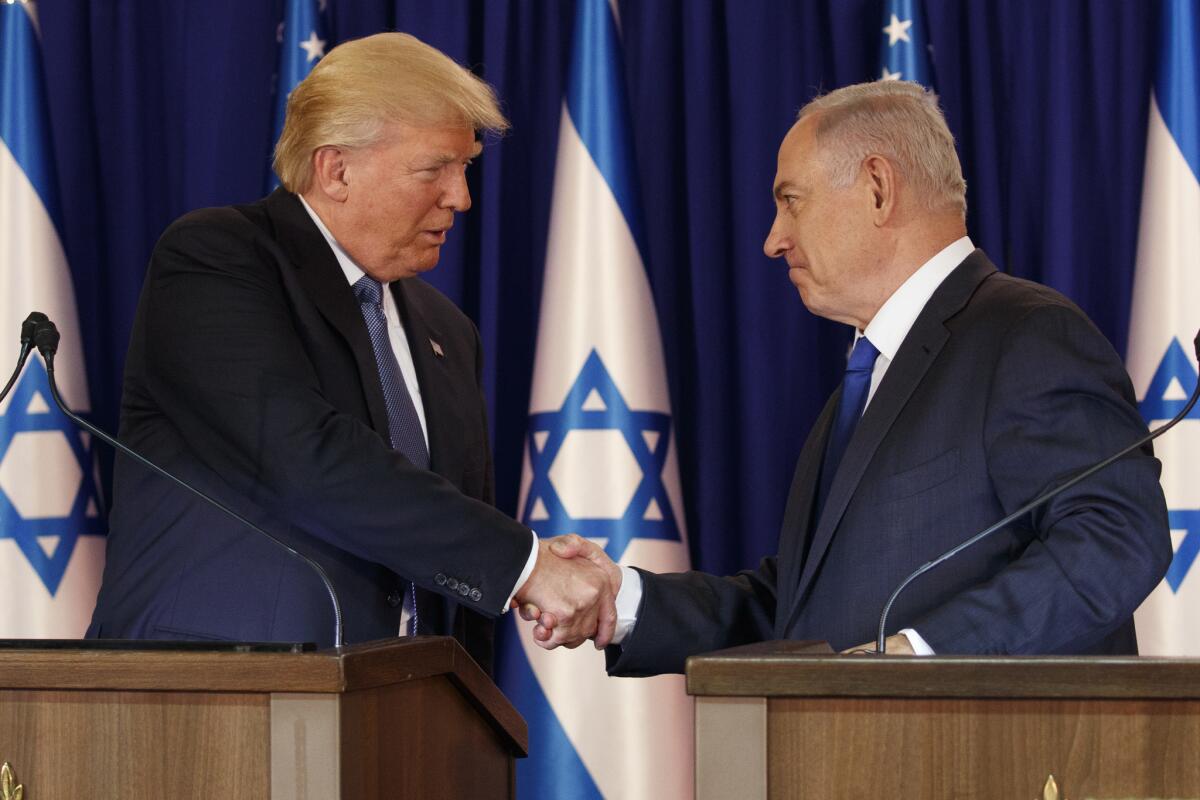Editorial: An agreement between Israel and the UAE is welcome, but it’s not the ‘ultimate deal’

The agreement between Israel and the United Arab Emirates announced with fanfare by the White House on Thursday is doubly welcome. It represents a recognition by another Arab state that Israel is a permanent part of the Middle East, and it forestalls for now the annexation by Israel of parts of the West Bank, a step that would have been disastrous for Palestinians’ hope for a viable state.
Yet the importance of the agreement shouldn’t be overstated. A comprehensive settlement of the Israeli-Palestinian conflict — the “ultimate deal” Donald Trump touted prior to his inauguration — remains elusive. The region seems no closer to a “two-state solution” in which an independent Palestinian state would peacefully coexist with Israel. The question is whether this agreement is a milestone along the path to such an agreement, or an exit ramp.
In agreeing to pursue diplomatic relations with Israel, the UAE has done something that every nation in the region should do. It has been more than half a century since the United Nations Security Council passed a resolution citing “the sovereignty, territorial integrity and political independence of every state in the area” (while calling for the Israeli withdrawal from territories it occupied in 1967). Israel is one of those states referred to in the resolution, yet before Thursday’s announcement only two Arab nations, Egypt and Jordan, maintained diplomatic relations with it.
It’s also hugely important that Israel has agreed to defer annexing parts of the West Bank. Those second thoughts are a response not only to pressure by the UAE but also to a seeming change of course by the Trump administration. In January, Trump unveiled a peace plan that, while it contemplated a Palestinian state, envisioned Israeli control of considerable portions of the West Bank, including the Jordan Valley. But when Israeli Prime Minister Benjamin Netanyahu was poised to annex parts of the West Bank this summer, some in the administration reportedly counseled caution.
Nevertheless, David Friedman, Trump’s ambassador to Israel, declared Thursday that annexation was “not off the table permanently.” Similarly, Netanyahu ominously is describing the decision not to move forward with annexation as a temporary suspension.
And while the Trump administration may have moderated its position on annexation, it’s still not clear that this administration recognizes that a lasting peace requires a viable Palestinian state as well as a secure Israel. Its support for the Israeli-UAE deal can also be seen as pursuing a different goal, part of a strategy to align with Israel and Gulf States in seeking to limit Iran’s influence.
Iran undoubtedly has engaged in disruptive and dangerous behavior, but this administration’s fixation on subjecting Iran to “maximum pressure” hasn’t succeeded in curbing Iran’s conduct in the region, destabilizing the government in Tehran or inducing Iran to agree to a deal limiting its nuclear program to replace the international agreement Trump repudiated in 2018.
Iran denounced the agreement between Israel and the UAE as a “dagger that was unjustly struck by the UAE in the backs of the Palestinian people and all Muslims.” That statement can be dismissed as posturing, but Palestinians themselves have portrayed the agreement as harmful to their interests. A spokesman for Palestinian Authority President Mahmoud Abbas said the UAE’s action was “an aggression against the Palestinian people.”
The Palestinians’ dismay is understandable. Their desire for a state has been frustrated for decades, partly because of poor decisions by their own leadership. But at least this deal postpones action by Israel that might have irrevocably made a Palestinian state impossible.
Ideally, Israeli leaders would realize that it is in their nation’s interest to zealously pursue an agreement with the Palestinians that would allow for Israel to remain a democracy and for Palestinians to fully govern themselves. The U.S. can play an influential role in realizing that vision, but only if it has credibility with both sides. On Thursday, Trump said, “We do have a lot more to come in the Middle East.” Those steps must include more direct progress toward a just and lasting peace between Israelis and Palestinians.
More to Read
A cure for the common opinion
Get thought-provoking perspectives with our weekly newsletter.
You may occasionally receive promotional content from the Los Angeles Times.






